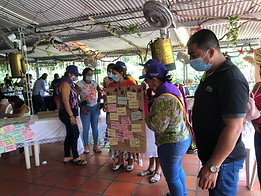
Tools and Resources
The STARS-C project follows a Participatory Action Research (PAR) Approach. It has been co-designed through existing partnerships between academics and two community-based organisations. Across three-phases everyday citizen stakeholders develop plans and strategies to drive community-led mental health systems improvements. We use participatory approaches at each phase, to ensure equal participation in generation and activation of knowledge held by everyday actors.
Co-Production principles
The project is informed by co-production principles to enable a platform for involving community members in the process of thinking through what changes are needed to improve access to, and the quality of mental health services. The research team includes community leaders who are co-investigators, shaping research questions, design and project oversight. Our community researchers live and work in the communities where research is conducted. The PAR approach allows everyday citizens to participate in the process of generating a new model for mental health systems improvement.
Who is involved?
A group of researchers from University College London Institute of Global Health, the London School of Economics and Political Science and Universidad de Los Andes (Colombia), working together with two partner organisations in the Caqueta Department (South of Colombia): 1) Corporación Manigua (Corpomanigua), a women-led organization working with marginalised communities in Florencia (capital city of the department) and, 2) The Multi-active Cooperative for Wellbeing and Peace of Caquetá (Cooperativa Multiactiva para el Buen Vivir y la Paz del Caquetá, COOMBUVIPAC), an organisation of former FARC-EP members, in the small village of Hector Ramirez, in the municipality of La Montañita.
Diagnostic:
- Assess local mental health systems capacities and capabilities in collaboration with service actors.
- Explore community understandings of mental health, mental distress, and wellbeing strategies in one urban and one rural PDET territory.
- Work with local communities to evaluate appropriateness of standard mental health measures, using participatory methodologies.
Intervention:
- Theory of Change: identification of challenges, assumptions, and preconditions, short and long-term outcomes and impacts, and backward chaining.
- PLA groups implementation
- Community Forums (community members, health providers and decision makers)
Evaluation:
- Cost-Benefit analysis
- Photovoice analysis


